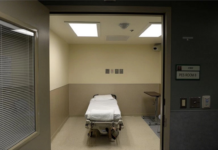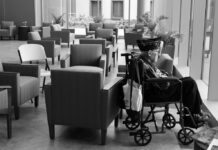The Helping Room
Every culture has its share of individuals who break down in bewilderment. People who hallucinate, behave beyond norms, seek to die, think in strange ways.
“Prisons Without Bars” – Forced Institutionalization of People with Disabilities
In the wake of deinstitutionalization, we no longer have the vast asylum system we once did. Instead, something more insidious has taken root — for-profit institutions that call themselves neurorehabilitation centers, group homes, and other official-sounding names.
The ACE Survey is Unusable Data
Do the effects of trauma matter more, or a person's ACE score? I think this is unusable data that harms people when you gather it. Here's why.
Feral Psychiatry: The Case of Garth Daniels
Garth Daniels, a 39-year-old Melbourne man, has been shackled for 110 days and forced to undergo ECT 94 times at three times a week against his will. Last year, his family asked me to provide a second opinion on Garth’s case. As predicted, my recommendations against continued ECT were quickly dismissed by the hospital. There are critically important issues at stake in this case.
The Law’s Flaw
Tom Burns, M.D., Psychiatrist and Professor of Social Psychiatry at Oxford, recently said of Assisted Outpatient Treatment (AOT) that “compulsion added to otherwise decent care makes no difference.” This was no easy conclusion for Burns, who for twenty years “argued ardently” for Community Treatment Orders (CTO’s), which are described as the British version of California’s newly passed AOT laws. "I worked for more than 20 years to get the CTO law passed," he said. "I thought such laws were going to make a difference, but they don't."
Appealing to our Elected Representatives
This is the final of four installments about the bizarre, ongoing conduct of psychiatrists at Upton House, an Eastern Health psychiatric facility in Melbourne, and the collusion with their conduct by all relevant agencies. This last installment will document the failure, so far, of the State and Federal Governments to intervene in even this most extreme and blatant example of abuse of power by psychiatry. If I, as a Professor of Clinical Psychology with 40 years clinical and research experience in this field, can be so easily dismissed/ignored by the relevant systems in Victoria, what chance do the average users of mental health services and their families have of being heard in this State?
The Angry Congressman: Tim Murphy’s Lack of Insight
The most spectacular part of Rep. Murphy’s hypocrisy has nothing to do with abortion or reproductive rights. Allegations of his dangerous behavior and his lack of insight into his own actions would be enough to commit him, involuntarily, to psychiatric treatment under the Helping Families in Mental Health Crisis Act that he championed.
Involuntary Hospitalization More Likely With Psychosis Diagnoses and Few Resources
New study links involuntary hospitalization with psychotic diagnosis, previous involuntary hospitalization, and economic deprivation.
Rethinking Public Safety – The Case for 100% Voluntary
It is time to create an entirely voluntary psychiatric system. International conscience is clear. The singling out of people with psychosocial disabilities is not worthy of a free society. There are better, safer ways to address legitimate public needs.
Study Finds High Risk for Suicide Following Psychiatric Hospitalization
Patients are at an increased risk for suicide during the three months immediately following discharge from an inpatient psychiatric hospital.
Veterans with both PTSD and Dementia More Likely to be Prescribed Antipsychotics
Researchers found that veterans with both conditions had higher odds of being prescribed second-generation antipsychotics than those presenting with just PTSD.
Study Examines the Difficulty of Withdrawing from Antidepressant Drugs
Correcting unnecessary long-term antidepressant use is difficult and met with apprehension by providers and service-users.
Bring Back the Asylum?
This week a commentary, written by members of the University of Pennsylvania Department of Medical Ethics and Health Policy and titled “Improving Long-term Psychiatric Care: Bring Back the Asylum” was published in JAMA Online. The authors recommend a return to asylum care, albeit not as a replacement for but as an addition to improved community services and only for those who have “severe and treatment-resistant psychotic disorders, who are too unstable or unsafe for community based treatment.” The authors seem to accept the notion of transinstitutionalization (TI) which suggests that people who in another generation would have lived in state hospitals are now incarcerated in jails and prisons. While I do not agree, I do find there is a need for a safe place for people to stay while they work through their crisis.
The Murphy Bill, HR 2646 — a Heinous Piece of Legislation — is Coming...
The National Coalition for Mental Health Recovery is calling upon all people of like minds, who care about individuals who need mental health services, to ACT. It is urgent. Please call your representative in the House of Representatives to vigorously oppose HR 2646 on Tuesday, July 5, 2016. And, call your Senator to insist that the Senate reject any amendments or changes to mental health legislation from the House by Friday, July 8, 2016. For more information about this Call to Action, please click here.
Psychiatric Diagnosis Can Lead to Epistemic Injustice, Researchers Claim
A discussion of the role of epistemic injustice in the experiences of patients diagnosed with psychiatric disorders.
The CHRUSP Call to Action, and Its Significance
Various instruments of the United Nations have commented on forced treatment, or involuntary confinement, or both (for details, see Burstow, 2015a), and a number of truly critical additions to international law have materialized. Arguably, the most significant of these is the Convention on the Rights of Persons with Disabilities. What makes it so significant? For one thing, it is because this landmark convention puts forward nothing less than a total ban on both involuntary treatment and the involuntary confinement of people who have broken no laws.
“If You Wanted to Kill Yourself, You Would Have Done It”
From The Independent: The notion of choice is increasingly being used to discourage suicidal people from seeking help. Many people's suicidal thoughts and actions are...
Criticism of Coercion and Forced Treatment in Psychiatry
A recent editorial, published in BMJ, argues there is an increase in coercive measures in psychiatry that are damaging to individuals diagnosed with mental illness.
A Diluted Murphy Bill Clears the House and Goes to the Senate
Organized psychiatry, committed irrevocably and wholeheartedly to drug pushing and to their corrupt and corrupting relationship with pharma, simply will not countenance the fact that their primary product is fundamentally flawed and destructive. So they hire a PR company; they fund and lobby politicians; they parrot slogans; and they encourage one another to ever-increasing heights of self-congratulation. But they will not commission a definitive study to clarify and assess the scale of this problem once and for all. And the reason for this inaction is because they know that it would be bad for business. It would "cause a lot of people to stop taking their medications."
Testifying in Vermont: Forced Drugs
Vermont Governor Shumlin recently suggested a change to state law that would accelerate the process under which a person could be forced to take antipsychotic drugs against her will. The House Human Services Committee reviewed this proposal and I was asked to testify. What follows are my comments.
Spotlight on Institutional Psychiatry
Spotlight on Institutional Psychiatry is a response by psychiatric survivors and allies to Operating in Darkness, a scathing 2017 report on British Columbia’s Mental Health Act Detention System. We hope that professionals will take note of the devastating effects of forced psychiatric treatment and be moved to speak out, and, above all, that survivors will feel encouraged and inspired by our efforts.
Michael Brown and the ‘Peer’ Movement
I’ve been arguing against calling this movement that I’m a part of a ‘peer’ movement for a long time. What has happened with Michael Brown in Ferguson, Missouri has helped me to crystallize that point. If we do not see what happens to some of us in the psychiatric system as connected to what happens to others because they are black or because they are transgender or because they love someone else of the same expressed gender (or because they live in poverty, etc. etc.), then I’m not sure any of us really, fully understands what it is we are trying to accomplish at all.
What It’s Like to Be Involuntarily Committed
Ten years after being fired for taking a mental health leave after the Virginia Tech massacre, I was diagnosed as "schizophrenic" and involuntarily committed to a hospital. Now I have a job and a life, but I'm still forced to take drugs and report to a social worker.
“This Microchip Will Deliver Drugs in Your Body by Remote Control”
-Motherboard reports on an implantable chip that can hold hundreds of doses of drugs and be activated by remote control.
$8 Million Awarded to Family Of Man Who Died in Risperdal Trial
A California jury ruled that Johnson & Johnson’s Janssen Pharmaceutical and a psychiatrist were responsible for the death of 25-year-old Leo Liu. During a clinical trial for Risperdal, Liu died of a heart injury that was “further complicated” by the drug and ignored by the study doctors. Janssen was found 70% responsible for Liu’s death and ordered to pay $5.6 million to the family.






















